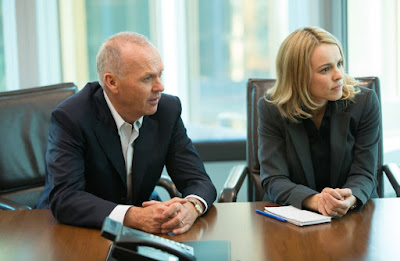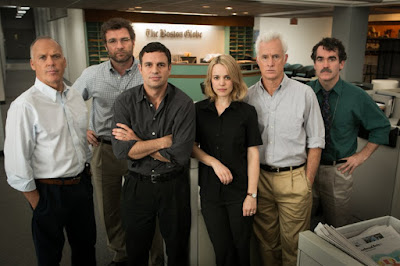Coming as it does on the heels of a documentary --
Kate Plays Christine -- that seemed to prove above all else how difficult and sometime pointless documentary film-making can be, the new narrative movie
CHRISTINE succeeds beautifully in bringing to life a life that most of us (if we'd heard of
Christine Chubbuck at all) knew only for the single act that "put her on the map."
In that regard, this movie is not unlike another excellent film that opened earlier this year,
The Witness, that managed, at long last, to give us a look at
Kitty Genovese in a manner that opened up her life into something much richer than the mere victim she'd seemed to have been down the decades since her murder. Rather than exploiting, both films honor their subject.
As directed by
Antonio Campos (shown at left), written by
Craig Shilowich (shown below) and
starring an actress who's currently as good as anyone performing in movies and TV --
Rebecca Hall (shown on poster, top, and further below) -- in what is, so far, the role of her career,
Christine succeeds in creating a time (the mid-1970s), a place (a local TV station in Florida), and people (workers, friends, family, interviewees) that come together to form the kind of spot-on reality that narrative movies rarely get near.
This is the first attempt at screenwriting for Mr. Shilowich (shown at right), and as such it is not simply good, it's rather phenomenal.
The writer has packed in so much, and all of it germane, fascinating, and very warts-and-all in terms of not only Christine herself but of those around her. This allows us to see the positives and negatives clearly and to come surprisingly close to understanding who Christine was and how her surroundings worked with her personality to determine what happened.
Over the course of the film we learn so much about Christine -- everything from her virginity status to her relationships with her mother, boss, co-workers and especially the co-worker for whom she feels more than the normal attachment (played with his usual skill and subtlety by that fine actor,
Michael C. Hall, below).
Via all of this, we come to understand Chubbuck as a terribly troubled yet talented young woman with rather heavily under-developed social skills. And so very good is Ms Hall is delineating all this that we quickly and hugely feel the embarrassment and naivete of this woman as she tries to work her way around and through various situations. Hall handles all of this so skillfully than not a moment registers as false or overdone. She keep us in her corner, even as she allows us to understand how that corner is so thoroughly fencing her in.
Hall has a large and often glowing face, but here she keeps the muscles in that face tightly coiled. Only when she is putting on the charming social-service puppet shows for the children she works with does she relax into those "puppet" roles to leave her constrained self behind. What a joy it is to see her suddenly liven and embrace! (
Christine is not the kind of movie our "Oscar" Academy usually embraces, but I dearly hope its members gird up their loins and take a look, because quite a number of people involved with it deserve nominations.)
Around halfway along this two-hour film, my spouse noted aloud, "This does not seem like a movie." (More and more often these days, Spousie uses the word
movie to double for the word
fake. After we've watched something or other, he'll shrug and exclaim, "Yeah -- it's a
movie.") Regarding
Christine, he is so right. This is about as real as it gets. Mr. Campos, a director whose past work (
AfterSchool and
Simon Killer) I've enjoyed, does wonders here, using a documentary style abetted by what seems like a near-perfect production design, including period costumes, hair styles and sets.
The manner in which Campos and Shilowich and their actors capture the little TV station and its workings (above) may but you oddly in mind of its polar opposite, that glossily entertaining cable series,
The Newsroom. (Or even better,
The Mary Tyler Moore Show, which is used quite cannily and sadly here.) Campos' entire cast -- which include
Tracy Letts (below, right) as Christine's adversarial boss,
J. Smith-Cameron as her alternately helpful and trying mom,
Maria Dizzia as her best friend who has her own necessary ambitions, and
John Cullum, as the TV station's money man -- is first rate. There are no villains here, and no heroes, either. Just people living and working as best they can -- and doing a pretty good job of it, considering the circumstances.
In yesterday's
New York Times there a fine
article about Rebecca Hall and the making of the film, in which it comes out that Christine's brother refuses to see it because he feels that it is exploiting his sister. I wish he would reconsider, for this film is anything but exploitative.
Christine is a movie that, during and after viewing, makes you look at things differently and understand them better. That's a tall order and it is served up here with intelligence, kindness and caring -- as expertly as you could wish.
The movie, from
The Orchard and running 119 minutes, opens this Friday, October 14, in New York City exclusively at
Film Forum. Elsewhere? Sure hope so, and as soon as further playdates becomes available, I'll post them here.















































